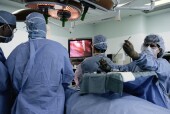
TUESDAY, March 27 (HealthDay News) — Angioplasty — a procedure to open blocked arteries — can be performed safely and effectively at community hospitals that don’t have on-site cardiac surgery units, according to a new study.
The study included nearly 19,000 patients who had elective angioplasty either at a facility with a cardiac surgery unit or at one of 60 community hospitals that didn’t have on-site cardiac surgery but met certain requirements.
The centers had to complete a formal angioplasty development program to prepare their staffs and establish policies and protocols, and also had to demonstrate a capacity to perform at least 200 angioplasties a year.
The researchers followed the patients for nine months after their procedures. There was no difference in death rates between patients who underwent angioplasty at facilities with cardiac surgery units or at community hospitals, and no significant differences in rates of complications including bleeding, kidney failure and stroke.
The study was presented Sunday at the American College of Cardiology (ACC) annual meeting in Chicago. Research presented at medical meetings should be viewed as preliminary until published in a peer-reviewed journal.
“The study shows that under certain circumstances, non-primary angioplasty can be performed safely and effectively at hospitals without on-site cardiac surgery,” lead investigator Dr. Thomas Aversano, an associate professor of cardiology at Johns Hopkins University, said in an ACC news release.
Until recently, community hospitals without cardiac surgery units performed only emergency angioplasties. Patients who required elective surgery were transferred to facilities with cardiac surgery units. That changed when new guidelines were introduced by the ACC and the American Heart Association.
“The study supports and reinforces the [new] guidelines,” Aversano said.
More information
The Radiological Society of North America/American College of Radiology has more about angioplasty.

